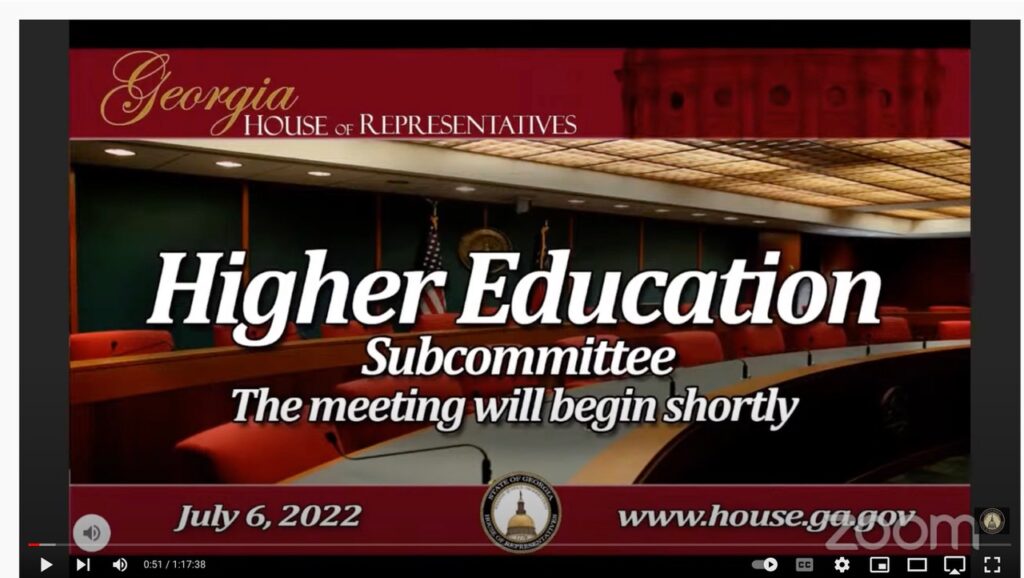
Workforce Development Subcommittee of the House Higher education Committee
Transcription by Rev.com (audio on the bottom).
—> Cost to us: $169.00
Donations can be made here.
Video here.
Rev.com divided the transcription on two parts. In part two, the transcriber used the entire instruction to label the “first voice heard…”, who was Chairman Rep Chuck Martin. Also the spelling of Rep Ginny Ehrhart is wrong in the below.
Sigh.
______
Chairman Rep. Chuck Martin: (00:02)
Okay. Good morning, everyone. I think we, uh, have a good turnout here. If I’m looking at our member directory, um, right with the, uh, the folks that are logged in, uh, and our, um, uh, staff.
Chairman Rep. Chuck Martin: (00:16)
I wanna thank [inaudible 00:00:17] Services for getting us put together and, uh, [inaudible 00:00:20] by now, I’ll be looking left and right. It’s not that I’m looking away from you, I’m on, uh… A machine that has a camera in front of me, but my, uh, uh, computer screen with the, uh, information I need on it is to my left, so you’ll see me looking a-a bit away.
Chairman Rep. Chuck Martin: (00:35)
Um, a-again, I wanna w-welcome everybody this morning. I’ll go over, uh, briefly what we gonna, uh, uh, try to accomplish today, uh, and then get right into it. First, uh, I wanna recognize, uh, our staff that I think has joined us. Uh, Kayla [inaudible 00:00:50], in our office. Brittany B-… Valentine, uh, is, is in our office. One or both of them are online with us.
Chairman Rep. Chuck Martin: (00:57)
Cortney George, with House Budget and Research, uh, will be with us this morning, and will be, um, um, supporting us through, uh, our subcommittee. Our wanna welcome all the members, I’ll get to you guys a little bit, uh, later. Uh, we also have some other representatives that are on the, um, uh, call this morning, uh, i-in the, the call with us in the room, if you will.
Chairman Rep. Chuck Martin: (01:19)
[inaudible 00:01:19], we have representatives from the University of Georgia. The Technical College, uh, System of Georgia. Georgia State Finance, the Georgia Chamber, and the Metro Chamber, uh, so welcome to you all, and welcome to everyone watching online.
Chairman Rep. Chuck Martin: (01:35)
This was, uh, uh, done today via Zoom, so that we could take care of, uh, some housekeeping and some, um, general, uh, [inaudible 00:01:45] as we notice, [inaudible 00:01:46] introduction to review some key points that we would be looking at during the sanction (session?), o-of the subcommittee and to talk about scheduling of future meetings.
Chairman Rep. Chuck Martin: (01:56)
So, that’s what we intend to do today. I hope to do it in, in an hour or less. So, we’ll go straight through, uh, without breaks. Uh, a-along those lines, what I’d like to do next is, um, and I’m gonna ask Brittany, or, or Kayla, or Cortney, uh, if want… If you could help us, kinda keep b-b-brief notes of this.
Chairman Rep. Chuck Martin: (02:15)
But I’m going to go to each of the members, um, and ask them to, to give a brief introduction, you know, what part of Georgia they represent, and, um, a, a, a thought, uh, on, on what you think we can do with this committee. Uh, or and… We’ll, we’ll dive into those into, um, i-into more depth later, but just a brief, uh… I’d like to [inaudible 00:02:37], uh, if I can this morning, with the vice chairman of the committee, uh, [inaudible 00:02:41], are you with us, [inaudible 00:02:42]?
Chairman Rep. Chuck Martin: (02:49)
[inaudible 00:02:49]
Jenny (Rep Ginny Ehrhart): (02:51)
Yes, I’m here. So-
Chairman Rep. Chuck Martin: (02:52)
Okay.
Jenny: (02:53)
Yes, I’m here. Sorry about that.
Chairman Rep. Chuck Martin: (02:56)
So, j-j-… Um, just give us a, a brief introduction, s-something, you know, you think we, uh, wanna, wanna touch on, on the impact we can make and, um, w-w-… I’d say unpack it at a, at a, at a lighter time, but just as, as part of the introduction.
Jenny: (03:11)
Right, um, well, you know, I’m just always appreciative for anything we can do in the State, in terms of workforce development, and I often say I, I kinda, from a little bit of a personal perspective, I’m actually, um, at my office right now in Kennesaw, Georgia, in a… Running a business that I started in my basement about five years ago, and now have 62 employees.
Jenny: (03:29)
Uh, my, my company partners with Georgia Cyber Academy. Uh, [inaudible 00:03:33] employees, we have high school students, got college students, um, so I’m always encouraged, uh, anything that we can do, I-I’m thrilled to be on the committee and e-… And excited to kinda see what we can do with… How is it gonna affect the lives of, you know, small businesses like myself, so, so, thank you again Mr. Chairman, for all the work and research you done, and I’m , I’m, I’m really looking forward to it.
Chairman Rep. Chuck Martin: (03:52)
Great, tha-… Thanks Jenny. Um, I was gonna get [inaudible 00:03:55] meeting Patty Bentley, um, next. I don’t know if Patty is with us. I don’t see her on, online. We’ll come back to Patty, um, next and just go in then in alphabetical order is, uh, Chairman [inaudible 00:04:09] with us? I don’t see him on the list, yeah… This morning, either.
Chairman Rep. Chuck Martin: (04:12)
Um, so, Chairman Dickey, I see you up there. Welcome. How you doing?
Chairman Dickey: (04:18)
I’m great, just wanna [inaudible 00:04:19], looking forward to, uh, [inaudible 00:04:21] for putting this together. Um, in the middle of our peak season right here, in Middle Georgia, and, uh, glad to get some rain and things going well, although we do have some supply chain issues, mainly due to workforce. Uh, getting some containers and boxes, and that sort of thing, uh, to ship our peaches in.
Chairman Dickey: (04:40)
But, um, I represent five counties, right here in Middle Georgia area, and, uh, Chairman of Ag Committee, and, uh, a-agriculture’s dear to my heart, but, uh, uh, [inaudible 00:04:54] and education is sort of key.
Chairman Rep. Chuck Martin: (04:57)
Thank you, Chairman Dickey. Um, n-next, the chairman of our House Education Committee, uh, [inaudible 00:05:02], you with us?
Matt Dubnik: (05:04)
Yes, sir. Good morning, Mr. Chairman. Um, Matt Dubnik, from Gainesville, representing Gainesville, Oakwood and other parts [inaudible 00:05:12] county, and as you said [inaudible 00:05:14] house, K-12 Education Committee and, and like Chairman Dickey just mentioned, agriculture is, is key to what we do, and is key to our State’s economy.
Matt Dubnik: (05:24)
Um, but I’m [inaudible 00:05:25] a-across every industry, Chairman Martin, that, that in my day job at w-… In the marketing business, any industry, any client, any size, anywhere, people are saying the same thing.
Matt Dubnik: (05:36)
I could grow my business if, if we had more, more qualified people and, and, uh, to, to fill those jobs and, and, and looking very specifically at some, some targeted stem, and agriculture focus [inaudible 00:05:50] on this committee.
Chairman Rep. Chuck Martin: (05:52)
Thank you, Chairman Dubnik. That’s, uh, that, that’s all so much great information and I, and I agree. I’m hearing the, hearing the same thing so, think what we, we wanna do when we get to again later in the committee is, how, how do we do that in the short-medium and long-term, uh, to, to bring, um, something to bear and, and help our businesses.
Chairman Rep. Chuck Martin: (06:10)
I see, uh, um, secretary of the committee, uh, Patty Bentley has joined us. I’m m-… I’ma back up and, and get in our secretary.
Chairman Rep. Chuck Martin: (06:17)
Good morning, Representative Bentley. You, you on mute. Unmute ya. There you go.
Patty Bentley: (06:26)
Good morning, [inaudible 00:06:26]. Um, I’m excited to see all of you today. I’m so sorry that unfortunately, I won’t be able stay all very long, we have a funeral service today, um, but I’m excited about, uh, the, the work that we [inaudible 00:06:40], um, accomplish, uh, on this committee, addressing the workforce issue [inaudible 00:06:47] so, thank you for having me.
Chairman Rep. Chuck Martin: (06:49)
Thank you. Thank you, uh, Patty. Uh, next, going down, um, is Betsy Holland, Representative Holland, are you with us? There you are, I see you up there, Representative Holland.
Betsy Holland: (06:59)
Mr. Chairman, thank you, and so, I represent a chunk of North Georgia, right [inaudible 00:07:04] North Atlanta, entirely within Fulton County. [inaudible 00:07:08] some of my colleagues, I’ve been 25 year veteran of the corporate business [inaudible 00:07:12] here in Atlanta, that’s facing a lot of the same concerns that we have. High paying, high quality, high benefit jobs, and how important it is for us to find talent, hopefully that’s homegrown here in Georgia, rather than having to seek it from other cities, or seeing some of those jobs go to other cities, because we can’t source the talent, um, here in Georgia. So, I’m pretty excited about the things that we can do here [inaudible 00:07:35].
Chairman Rep. Chuck Martin: (07:35)
Awesome, and thank you, thank you for joining us. We gonna go down to the coast now, Representative Jackson, Edna Jackson, are you, uh, out there with us? I saw you earlier.
Chairman Rep. Chuck Martin: (07:54)
Representative Jackson, if you trying to talk us, you on mute.
Edna Jackson: (07:56)
Thank you. Can you hear me?
Chairman Rep. Chuck Martin: (07:56)
There you are. Yes, mam.
Edna Jackson: (08:03)
Okay. Thank you. It’s just a pleasure, thank you for the appointment to serve on this committee. I’m always interested in eco-… Economic development, and also things that can be done, down here on the lower end of Georgia, the coastal part of Georgia.
Edna Jackson: (08:17)
My interest goes into workforce development. I represent so many different areas, Garden City, uh, Thunderbolt, the inner-city of Georgia, everyth-… The inner-city of Savannah, and all along the northern end. So, I’m looking forward to working with you, of course you know, there is a lot of development that is coming into this area.
Edna Jackson: (08:41)
I’m hoping that we gonna talk about jobs that will be offered. How do we get together and offer, through our institutions, uh, uh, jobs that can assist us in getting more people to go into certain areas where the jobs really are.
Edna Jackson: (09:00)
So, this is just an honor to be a part of this committee.
Chairman Rep. Chuck Martin: (09:04)
Thank you, Representative Jackson. Thank you for joining us, I’m… I’m back up. I see, uh, Representative, Chairman K-… Uh, Kasey Carpenter has joined. Uh, Chairman Carpenter, we just doing an introduction and if you, you wanna provide us a brief word about what you may, uh, like to see us look into, and we will… We will get the, the details of it, here after introductions.
Kasey Carpenter: (09:23)
Absolutely. So, [inaudible 00:09:25] Carpenter, Northwest Georgia, Dalton Whitfield County, um, a manufacturing hub for the state of Georgia, and I’m personally in the service industry, hospitality industry, I’m in the restaurant industry, and obviously my, my desires from this [inaudible 00:09:39] to, to figure out pipelines that are untapped, as far as [inaudible 00:09:43] goes in the State of Georgia.
Kasey Carpenter: (09:44)
People that we’ve educated. There are K-12 system, so I look forward to working with everybody. I actually had the great opportunity of eating Chairman Dickey’s peaches this morning with my pancakes for breakfast-
Edna Jackson: (09:55)
Ah! (laughs)
Kasey Carpenter: (09:57)
On the, on the Gulf Coast. So, uh, I look forward to, uh, spending little of my vacation time on this fine and, uh, outstanding group you’ve put together.
Chairman Rep. Chuck Martin: (10:07)
Thank you, Chairman Carpenter. Never, never bad time to shout out for, uh, Dickey’s peaches down there, never a bad time to, to have that shout out. Um, okay, going down, I think, uh, Representative Parker, I, I see you down there. Um, Good morning, Sam.
Sam Park: (10:24)
Good morning, Mr. Chairman, uh, so thank, thanks for having me-
Chairman Rep. Chuck Martin: (10:27)
Sam, Sam [inaudible 00:10:28].
Sam Park: (10:30)
It’s just a nice bathroom. (laughs)
Chairman Rep. Chuck Martin: (10:32)
Yes, sir.
Sam Park: (10:33)
We got a little fancy. Uh, but, um, State Representative for House District 101, uh, [inaudible 00:10:40] Lawrenceville, Suwanee [inaudible 00:10:42].
Sam Park: (10:44)
Um, this is, [inaudible 00:10:46] development is such a important issue. Um, I’m kind of interested in the subject from a few different angles. Uh, one, is short-term, long-term perspective. I think there’s a lot of, uh, things that this committee and, and [inaudible 00:11:00] address some of the short-term needs, and then there’s some [inaudible 00:11:03] part of the Legislation Act, Kasey Carpenter has introduced, that will address some of those [inaudible 00:11:08], uh, workforce shortages.
Sam Park: (11:11)
But I’m also interested at looking at [inaudible 00:11:13] looking at education, uh, from early childhood development [inaudible 00:11:22], uh, to higher education, whether that’s a USG institution, or a TCSG institution. Um, and then the [inaudible 00:11:30], on certainly, um, being a better understanding of the needs of both [inaudible 00:11:35] chamber.
Sam Park: (11:37)
Uh, but to ensure that the next generation virgins and, and students, um, really have the skills and capacity, uh, to adapt [inaudible 00:11:49] driven by technological [inaudible 00:11:50] higher education institutions, but, looking forward [inaudible 00:11:51] conversation and, and certainly, uh, happy to be within the service to, to meet Mr. Chairman and, and this committee.
Chairman Rep. Chuck Martin: (12:05)
Thank you. Thank you, Representative Park. Uh, great comments. I, I agree with ya. I think the short and long term, we have to look at both of them, um, and then I think some of the things that, uh, we could do, are gonna start in, in K-12 and, and again that’s not saying K-12 is doing wrong things now, but I, I think there, uh… If we, if we look across the, the pond at some places, um, there, there can be some, um, tweaks made and improvements, uh, that, that might help us, uh, maybe a decade down the road by, by the time it gets to workforce but, uh, we, we can look at all of those thing, we’ll count on Chairman Dubnik to, uh, to help us with that.
Chairman Rep. Chuck Martin: (12:40)
Uh, is, um, Chairman Pirkle here? It’s, uh, Clay Pirkle, I didn’t see him on, on, on the list, he may have not been able to get with us this morning. Um, uh, then we’ll go to, uh, [inaudible 00:12:52], I see you just popped up there.
Chairman Rep. Chuck Martin: (12:54)
You, you know the alphabet, you knew you were next.
Marcus: (12:56)
Good morning, Chairman.
Chairman Rep. Chuck Martin: (12:57)
Good morning.
Marcus: (12:58)
Uh, yes, sir. I’m paying attention to the [inaudible 00:13:00]. Um, I… I’m over in the Athens, Watkinsville area, District 119, uh, home of [inaudible 00:13:08], but, uh, you know, as far as this committee goes, I mean, I think you heard from several people already, I think the… One of the best things that lends us, uh, to serve Georgia well, is that it is [inaudible 00:13:20]. We all are in our own facets of business. Uh, I, myself am in the construction industry.
Marcus: (13:26)
We, we operate in Florida, Georgia, South Carolina, and certainly know the, uh, effects of [inaudible 00:13:33] workforce or the need for, for, uh, for the development. Um, I spent a good amount of time actually going to talk to technical schools, trying to, you know, encourage the construction management world, to come, to come into… To come in our, our [inaudible 00:13:48], if you will, and, um, just look forward to hear what everybody has to say and continue develop programs such as that.
Chairman Rep. Chuck Martin: (13:55)
Thank you, thank you, uh, Markus. That’s a… G-great thoughts, I mean, good construction, you know, may as… But that’s s-s-something I saw, uh, um, a few weeks ago. I was looking in, and then they were, they were talking about engineers and, and, not all engineers have to [inaudible 00:14:11], I mean its, uh, they were, they were just discussing what people think of the engineering field and construction management and it, it can be a lot of different things. You can make it what you want to be and, uh, maybe we do a better job of what, uh, students know both traditional, you know, graduates from people that are, you know, [inaudible 00:14:29] back into the workforce, what, what’s available to them.
Chairman Rep. Chuck Martin: (14:30)
Uh, listen, somebody, uh, on here, via phone, I wanna make sure that wasn’t Chairman Pirkle, um, uh, s-six, f-five, five, seven, was that you, Chairman?
Chairman Rep. Chuck Martin: (14:43)
I’ll, I’ll take that as a no then, and move on. And I guess, we are… Chairman [inaudible 00:14:49], we a little bit out of alphabetical order, but we drafted you over, um, you know only member here that is not a member of our higher [inaudible 00:14:56] committee, but, uh, very important to this discussion, uh, Trevor [inaudible 00:14:59] is with us. He’s gonna serve with us as [inaudible 00:15:03] House Economic Development Tourism Committee, and I don’t think you find any place where workforce is more important than economic development. Chairman Stevens.
Chairman Stevens: (15:13)
Thank you, guys. I’m looking forward to seeing where we go. We all worked very hard over the past few decades to get us the, uh, designation of, um, the number one State to do business [inaudible 00:15:25] decade, and, uh, that didn’t come overnight. Now all we gotta do is fill in the blanks, very slowly and very methodically, so that we don’t do anything to, uh, to harm that designation.
Chairman Stevens: (15:35)
We’ve got lot of opportunity, and, uh, a lot of people are moving to Georgia. We gonna be the fifth largest state in the country in the coming years. Uh, so, people are coming to Georgia for what we got. So, thank you all for serving.
Chairman Rep. Chuck Martin: (15:50)
Thank you, Chairman Stevens, and, and we really gonna count on you, I’m… Uh, you know, [inaudible 00:15:55], and, and, uh, hope you can really help us in connecting along with the folks I go to next year, in, in our various chambers, the Georgia Chamber can, you know, activate its members across the state, to bring in businesses, there stakeholders.
Chairman Rep. Chuck Martin: (16:09)
But, I know and, and, uh, economic development business, you, you see that first hand on your committees, so we gonna count on those folks to engage, uh, stakeholders and [inaudible 00:16:20], uh, I guess first tell us, you know, what, what, what they need and, and, how we can partner with them to do that.
Chairman Rep. Chuck Martin: (16:26)
Um, okay, so, um, that, that concludes, um, our introductions from our members… One final shoutout, is Chairman Pirkle… He may have just missed us today. So, we will brief him, and I just mentioned, um, the-… These folks and ask them if, if they would like to add something. I think there’s a representative from the University of S-… University System of Georgia, uh, we thank you for your partnership. Ya’ll are gonna be a great resource, we’ve talked to you a little bit, um… Uh, Casey [inaudible 00:16:56], did you want to add anything?
Casey (Kasey Carpenter): (16:58)
Thank you, Chairman Martin, we appreciate you, um, having us on the call today, and really starting this conversation off. We, um, h-hear at University System of Georgia, uh, certainly recognize our employment role and preparing the State’s workforce, and look forward to, um, not doing that in a silo, of course, and listening to you all and industry employers to share, sort of where we are today, um, look forward to providing some [inaudible 00:17:22] committee, but also listening to and planning for the future.
Casey: (17:24)
Um, [inaudible 00:17:25] has made clear that, um, he wants a data driven, uh, solution to our, our sort of next, next generation of workforce [inaudible 00:17:33] and somewhere, actively working on that at the University System, and look forward to getting your input, um, and taking, taking directions. So, appreciate you having us. Thank you.
Chairman Rep. Chuck Martin: (17:42)
Thank you, [inaudible 00:17:43]. Um, n-next, the Technical College System of Georgia, I don’t know if we have, uh, a representative on, or them…
Chairman Rep. Chuck Martin: (17:52)
There you go, [inaudible 00:17:53]. Hey, how are you doing?
Speaker 13: (17:55)
I’m good-
Chairman Rep. Chuck Martin: (17:55)
Good to see you.
Speaker 13: (17:55)
Good to see you as well.
Chairman Rep. Chuck Martin: (17:57)
Before you, uh… Before I let you introduce yourself, I, I wanna make a point that, uh, um, you opened my eyes to… When, when we spoke at the, the Chamber, uh , Committee, uh, down in Savannah, or down in Saint Simons, and, and that was, um… She mentioned the, um, the career grants that we have, her career grants, and, and we, we talked about this year, about the, um, completion thing that, that we did, and, and our house [inaudible 00:18:26] to, to have help students cross the finish line.
Chairman Rep. Chuck Martin: (18:28)
But one of the things that I’m gonna kinda preview here before I go to her is, uh, she mentioned these career grants, and I don’t think we do a good enough job telling traditional students that that is out there. So, when we talk about not having need space funding, for people that wanna get into a workforce, I think sometimes, we, we don’t do that well enough.
Chairman Rep. Chuck Martin: (18:50)
And she made that point down, uh, as part of that panel discussion, and it really turned a light on for me, and, and I want us to, uh, break that out later, and, um, you know, we don’t have time this, this morning [inaudible 00:19:03], to do it.
Chairman Rep. Chuck Martin: (19:03)
But I want you to, to talk to the committee when we get back together about not just the, the career grants that pay the, you know, tuition fees and, and so forth, but how there are other things you can roll into from a federal perspective, that can get these folks in, in paying jobs quickly and with l-l-limited or no out of pocket costs. That was, I mean, there was just a great light you turned on for me, and I want you to share that with the committee.
Chairman Rep. Chuck Martin: (19:29)
So, I, I took away your [inaudible 00:19:31], but please, uh, t-tell us about yourself and, and what you like to see us look at, at… The committee.
Speaker 13: (19:37)
Well, um, greetings all. [inaudible 00:19:39] And, um, so my office administers the [inaudible 00:19:48], that we received that goes to, uh, our local workforce development areas.
Speaker 13: (19:53)
[inaudible 00:19:53] job training for individuals who have barriers to employment. Um, and of course, I-I’m here in representation of the, the system, system offices of all of our 22 technical colleges of the work that we do. And, uh, I just want to, uh, let you know that, um, [inaudible 00:20:11] is workforce development. That’s really our, our whole hearted focus in every aspect.
Speaker 13: (20:17)
Um, uh, um, the work that we doing is to, to lift individuals up, whether they are, uh, individuals who lack eyes for Diploma, or they’re a traditional student, or they’re a older student returning to, uh… To try and gain some, some better skills to be able to support their family.
Speaker 13: (20:35)
Um, we look forward to working in [inaudible 00:20:37] with, with this committee, and, just wanna, just want to say that, um, we as a whole, uh, really appreciate all the support that we saw this, uh, this past session, um, and, uh, there was some, uh, great legislation pass that we felt like, we could do a lot of good stuff with, around apprenticeships and, and, um, you know, the, the other, uh, legislation that you mentioned, uh, Chairman Martin.
Speaker 13: (21:00)
So, I just look forward to, to helping, uh, this group carry your vision forward.
Speaker 13: (21:09)
You muted, sir. You muted.
Chairman Rep. Chuck Martin: (21:12)
Yes. I was… I had a little allergy over here, cough, that was coming in. I was afraid I was… Over, uh… Or competing with you for audio.
Chairman Rep. Chuck Martin: (21:21)
Um, Georgia State of Finance, uh, Commissioner Riley. President Riley, I, I don’t know, are you commissioner, president, I think, uh, president over there, correct?
President Riley: (21:30)
Ye-… Good morning, Mr. Chairman, thank you and delighted to be with you, and members of the committee today, uh, [inaudible 00:21:38] University System [inaudible 00:21:40] System.
President Riley: (21:40)
We’re excited to be part of this conversation, and hope to add whatever data on [inaudible 00:21:48] and our many programs that have helped develop our workforce in the past. And, uh, provide insights on any, uh, suggestions and ideas that might come out of this committee for changes to the existing programs or potential new programs that can help grow our workforce and get folks out there quickly, with minimum out-of-pocket expense and to keep that student dept down to a small, as potentially possible for every Georgia student.
Chairman Rep. Chuck Martin: (22:16)
Thank you, President. I, I think I’m , I’m gonna just brief put a exclamation here. Um, President Riley points out th-… Some things that I think we can help with the committee do… Uh, we can, as a committee help her do, and that is, uh, you know, trace the affectiveness and efficiency of, of [inaudible 00:22:36]. Those would be dollar, you know, [inaudible 00:22:38] dollars in some cases, they would be state dollars, in other cases…
Chairman Rep. Chuck Martin: (22:42)
But to provide some measureables on those, um… So, that we can, you know, you can do a better job of, of, you know, guiding our human capital, but, um, watching our, um, our, um, dollars, our state dollars, uh, just, just capital investments, uh, toward doing, doing, uh, that.
Chairman Rep. Chuck Martin: (23:01)
So, we’re, uh, looking forward to working with, with her on those, um, those plans and, and to see the information that she has collected, you, uh… We, we gonna be very surprised that, that some of the great information we gonna have in our disposal from, from her.
Chairman Rep. Chuck Martin: (23:17)
Um, I’m gonna mention two, two folks that, I, I have listed that, we don’t have on the caller. I don’t believe, this morning, and, and if they are… If we do, we can speak up, but, uh, Chairman Dubnik, we, we didn’t actually, uh, reach out and ask somebody from the Georgia department of education to join us this morning. We didn’t wanna overstep our boundary, but, um, we, we do want to be involved as representatives part [inaudible 00:23:40] and, and I agree, I think, um, the, um, coordination between K-12 education and, and higher Ed towards workforce, um, through the University System or [inaudible 00:23:51] is very important. You know, even things such as, you know, how we, uh, measure, um, uh, advanced placement forces and how they’re, they’re graded.
Chairman Rep. Chuck Martin: (24:00)
You have to have a foreign… if you want… This, this track of, you know, [inaudible 00:24:05] work over there and… So, we wanna have them, and I just wanted to mention that we not have them this morning. Uh, o-other and also, is the Georgia Independent College Association. We have a lot of people out there in the private college world.
Chairman Rep. Chuck Martin: (24:17)
Uh, we wanna involve them, uh, toward, um, you know, maximum, uh, efficiency of our deployment of capital. So, then I would like to, uh, go through the Georgia Chamber. They’ve done a resource to us, so far, in, in helping me with some ideas, uh, in… And I have David, I think we have David (Raynor)[inaudible 00:24:36] from the Georgia Chamber… If, if you’d just like to add a couple of things and we gonna count on you, uh, with [inaudible 00:24:43] for, uh, [inaudible 00:24:45] stakeholder to this and, and talking to us about the needs and, and our willingness to partner with the [inaudible 00:24:49].
Chairman Rep. Chuck Martin: (24:49)
So, so with that, David.
David (Raynor): (24:50)
Happy to, and good morning Mr. Chairman, members of the committee. Uh, we certainly, from the Georgia Chambers perspective, in the state [inaudible 00:24:56] business community, appreciate the, uh, the focus and the interest on addressing, not only our current workforce needs in the State, uh, but our future workforce needs, um, as well.
David: (25:07)
I know that the Georgia business community applauds our record lo-… Uh, record, uh, low unemployment, uh, and the unprecedented economic development in [inaudible 00:25:15], so we’ve had over the last couple of years. Uh, but of course, with that, comes some challenges, with record job growth comes some challenges, and meeting that, uh, that demand for job growth.
David: (25:25)
And so we, uh, we want to remain a partner with you and your committee as we move forward. One point for consideration for the committee this morning, uh, Georgia job posting is quarter two, topped 460,000 throughout the state, and with the top occupations being software developers, registered nurses and commercial truck drivers.
David: (25:47)
So, you can see that [inaudible 00:25:48] industry sector and business size, throughout the state. So, so moving forward, we hope, uh, what the committee may be interested in looking at, and, and hopefully, we’ll examine, we’ll be worker exit, whether that’s through, uh, resignations, [inaudible 00:26:03] tsunami, or [inaudible 00:26:05] that are retiring. Uh, or reprior-… [inaudible 00:26:08].
David: (26:09)
Um, the skills gap is another issue that we have taken a look at, as well as the global talent shortage. Um, and then of course, career pathway alignment, in working with our K-12 education system, as well post secondary.
David: (26:23)
Uh, and then finally, looking at, uh, maybe some issues around the population decline that we’ve seen in some rural areas in the state and how that, uh, overlays with our, with our workforce needs.
David: (26:33)
So, again Mr. Chairman, just appreciate the opportunity to, uh, have, uh, couple of minutes just to address the committee today and look forward to working with you moving forward.
Chairman Rep. Chuck Martin: (26:42)
Thank you, we gonna, we gonna count on it, um, we trying… We gonna put, put you guys to work.
Chairman Rep. Chuck Martin: (26:48)
Um, we also have a c-couple of representatives from the Metro, uh, Atlanta Chamber. They have, uh, um, done some things… I guess, uh, [inaudible 00:27:00] but, you know, you guys have done things in the, the past that… To try to develop a bit of a launch [inaudible 00:27:06] Um, you know, wh-… Where student, you know, wanna be, and, and what they… Aptitude and attitude [inaudible 00:27:17], so, its very good to listen to that, but I know you have many, many other things.
Chairman Rep. Chuck Martin: (27:20)
So, please, uh, you know… We have you… Are, are you [inaudible 00:27:24], introduce yourself and, and, uh, touch on your, your points that you stakeholders are, are looking for.
Speaker 16: (27:30)
Yes, thank you Mr. Chairman and members of the committee. Um, we [inaudible 00:27:37], we excited for the work of this committee, subcommittee and grateful that the Chairman for leading this work and inviting us to be a part.
Speaker 16: (27:43)
Um, does anybody on this committee know, um, economic development is at the heart of what the Metro Chamber does, um, and talent and workforce demands are the number one concern that we hear from companies. Uh, we have a number of partners and member companies [inaudible 00:27:58] who are very eager to support the work of this subcommittee, so, um, we are excited to get this folks onboard and start getting them engaged.
Speaker 16: (28:06)
Um, we also [inaudible 00:28:08] research on barriers to workforce and talent, which we are happy to share, um, and as the Chairman mentioned, the work that, um, the Chairman was referencing, is the [inaudible 00:28:17] science report of talent pipeline report in which we measured the aptitude and interest of students on where there is ove-… Where there is overlap, there will we see, uh, where students interest is and where their aptitude is and where… if we can find that overlap, that may be a career path, um, that is going to really, uh, work out for that students.
Speaker 16: (28:36)
So, we happy to share research like that with, um, with the committee. Um, in additional research that we have that shows, um, skills gaps and other barriers [inaudible 00:28:46]. So, those are some of the resources that we are happy to learn to the committee, and, um, we’ll be updating some of that work later this year, and we look forward to working with the committee to inform our research moving forward, and to also be of service to the group as we move forward.
Chairman Rep. Chuck Martin: (29:01)
Thank you, [inaudible 00:29:02]. Did you want to add anything? I will… We’ll let the… You both got on here, we’ll give you a double dip.
Speaker 17: (29:07)
Nope, I think [inaudible 00:29:08] hit everything, thank you Mr. Chairman.
Chairman Rep. Chuck Martin: (29:11)
Awesome. Um, let me get back to our… I jumped ahead of myself here, um, g-going for the, uh, potential calendars, so let me, let me back up to, uh, back it off, uh, off target.
Chairman Rep. Chuck Martin: (29:26)
We-… That was, um, w-what we had for introductions, and it, it leads us… We about 30 minutes, uh, into the call, wanted to keep to an hour, so, so then, t-the key points that, um-
part 2
(first voice) Chairman Rep. Chuck Martin: (00:00)
And the- these are very high level that, that we wanna look at. I think we had, uh… wanna throw ’em out there and just open it up for the members, you know, and their thoughts to add addition ones, but one of the things in, in talking with the, the, the folks at the university system, TCSG, is, is to try to develop, if you will, um, our, our agendas for, uh, I think probably three meetings going forward was, you know, finding our needs, you know, how to, uh, address those and, you know, [inaudible 00:00:36] mentioned it earlier, in the short, medium and longterm format. And to, to do that, we’re obviously, uh, we brought all of you well served, um, you know, to, to develop a thought toward a mission statement. I, I looked and the university system, the te- the Tech College System of Georgia and, and Georgia K-12 all have mission statements, um, and I, I have them written down, I wrote repeat them, but they’re, they’re all, you know, toward, you know, education and, and building a, a workforce or, or building leaders for the future.
(first voice) Chairman Rep. Chuck Martin: (01:10)
Which seemed that, you know, we would want to develop, you know, that mission, um, toward integrating those three. So I think one of the things that we, you know, I would show out, um, is that we wanted to develop a, an efficient and effective manner for integration of, of those three resources in addition to our private colleges to deploy capital resources, um, and, and become, you know, more efficient at developing the workforce of the future.
(first voice) Chairman Rep. Chuck Martin: (01:40)
Um, I think we have to be realistic in the, the economy with inflation the way, uh, we want to. I think we need to keep in mind that we may need to develop ideas that don’t require additional funding, that, that repurposes the funding that we have. Um, I think we need to identify and gather needs from our stakeholders, businesses, you know, what they need and, you know, what they’re just missing when they’re trying to get to people. Um, and we, and we also could look for and we’ve seen some… if you have, and this goes to the representatives, uh, that are on the call and anybody that’s listening and, and to our, our partners at the Chamber, if you’re aware of, of innovative programs that, that may be working as one office around the state for a particular technical college or component of the university system that, that are building, um, connection with a particular industry.
(first voice) Chairman Rep. Chuck Martin: (02:37)
I think it would be good for the committee to hear that, um, and hear how that was done. We may not need to replicate that all over the state for that particular industry, but we may be able to re- replicate the process. So with that, members, do you have, um, ideas of what you’d like to see on our agendas as we, you know, develop a, an agenda for the three me- meetings going forward now? Uh, now would be a good time to sound that out and if not, I’m gonna… the homework at the end of the, the meeting is going to be, one of the things is going to be get us those ideas, uh, as we begin to develop the, the agendas. Does, does anyone have a, adi- additional thoughts?
(first voice) Chairman Rep. Chuck Martin: (03:20)
Chairman Carpenter, I know you always have something for us.
**Chairman Carpenter: (03:27)
Well I think you guys, um, I mean I think, uh, Representative Park, uh, eluded to my situation and my thoughts. Obviously I’ve been pushing the, the issue of, uh, **opening up higher ed to the DACA recipients in our state, the 20,000, 21,000 DACA recipients, so obviously I’d love to have that, continue to have that conversation, I think it makes a, um, very good sense when you look at it. We’re, we’re already educating these kids in our K-12 system. We’ve got, you know, $120,000 of sunk cost in these individuals and these are high achievers, um, and we wanna retain ’em in our state as ma- as much as possible so they don’t leave, go establish residency in other states and pursue higher ed in a different state, right? So we are losing a lot of kids that way in, in a time when we don’t need to lose anybody, especially extremely talented individuals, uh, I think it’s definitely something we gotta address.
(first voice) Chairman Rep. Chuck Martin: (04:20)
Okay, what else? Anyone else?
Representative Park: (04:23)
My Chairman-
(first voice) Chairman Rep. Chuck Martin: (04:25)
Sure.
Representative Park: (04:25)
Uh, Representative Park here. So, um, the thought that came to mind is if you’re planning on having three committee meetings, or three meetings with this subcommittee, perhaps you could essentially focus each meeting on the needs of, the needs that exist within the short term, both the medium term and the long term. Um, I think it was David Rainier from the Georgia Chamber saying, uh, you know, one of the big short term needs that currently exists within the state is this, you know, 460,000 jobs that don’t exist, um, or, or, or these open positions that have not yet been filled and certainly again, um, Representative Carpenter has introduced at least one solution, um, I think to help address that workforce gap that currently exists that certainly could, uh, be filled within, you know, a year or two.
Representative Park: (05:13)
I’d love to hear the thoughts and, and additional feed backs of some of those [inaudible 00:05:17] proposals from the chamber, the [inaudible 00:05:20] chamber and other, uh, members of the business community and certainly also from TCSG, but, um, again, I think, uh, perhaps tailoring each of the meetings with a focus on the needs of the short run, the middle run and the, and the long run, um, I think it would be a helpful way of, of breaking down, uh, the agenda.
(first voice) Chairman Rep. Chuck Martin: (05:43)
Thanks, Sam, thank you Representative Park. Um, let me, uh, in fact to try to draw some additional conversation out here and, and [inaudible 00:05:50] I don’t know if you’re with us… yeah, you’re still there. Um, the job postings from, you know, that you mentioned were the, uh, the top three were software engineers, registered nurses, commercial, uh, commercial truck drivers. I know that there’s, uh, been a push and, and again, it was mentioned, uh, at, at a meeting earlier this year that, uh, Coca Cola company, I believe, correct me if I’m wrong here, but I believe they, uh, they donated or, uh, either have donated or pledged, you know, to, to put in, you know, to place, uh, a million dollars toward that effort. Am I re- recalling that correctly, David?
David: (06:30)
Yes, sir.
* (first voice) Chairman Rep. Chuck Martin: (06:30)
Okay, so, so and we said that before is obviously Coke is a very altruistic company, they, they’ve done a lot of things for Metro. Uh, Coca Cola itself and the founders of Coke, I mean, they’re pillars in the, you know, in the community, but Coca Cola also did that because they see a need for that particular, um, job in, within their, uh, within their, uh, distribution business, so that’s great. So, so I guess my question on those three jobs and, and Karen, this would go to you, again for, for, you know, a meeting coming up in the future, not necessary we’re gonna be driving it today, but what, you know, where are some RN’s, some registered nurses that are, you know, where are they just short? You know? You know, we don’t have the people to go there, are they missing one class, are they having **trouble getting through the licensure process, the, do we have compa- compatibility issues with people moving here from other states and, and getting licensed?** So, I think those are the things that we need to find out, you know, obviously we can’t train a, a registered nurse by the fall, right?
(first voice) Chairman Rep. Chuck Martin: (07:38)
I mean, you, you, you can’t do that, but are there some folks that would like to take that job, but they can’t, or they won’t, for a particular reason? I know, during the pandemic, I know a lot of people got out of the medical business because quite frankly, I think it was, you know, stress overload, I can’t do this anymore. Um, I mean, so part of the workforce things is, you know, is there a way to have a conversation with those folks and get ’em back in part time and that’s working with our medical community to, again, they maybe already are doing this, but job share, those type of things. So is that something, you know, Karen and David that would be work a breakout session is to these are the top five jobs that, you know, are posting and, and we’re, we’re just short of filling ’em.
(first voice) Chairman Rep. Chuck Martin: (08:30)
Like this, this person is applying and checks nine out of 10 boxes and the tenth box is this. How, how do I get that? Um, is it, is that something that would be worth a section or a segment, David (Raynor)?
David (Raynor): (08:45)
Yes, sir, Mr. Chairman. I think from our investor’s perspective, you know, we hear a lot from the, from our partners in the healthcare industry as well as the technology sector, um, and then manufacturers as well, so, um, those are, those are three that come to, that come to mind that I think certainly would be a, a valiant effort for the committee to, to undertake in looking, um, and drilling down more so in those, uh, specific industries. Certainly don’t want to leave other industries out, uh, but I think that’s where we hear of the biggest need at this point from our investors, at least, and, and our partners at the Metro Atlanta Chamber may, may have some other sectors, um, that they hear from.
(first voice) Chairman Rep. Chuck Martin: (09:23)
Okay.
Robert: (09:26)
Yeah, uh, Robert [inaudible 00:09:28]. Um, and that, that part you bring up, those, uh, add some question for me. I mean is it the, the lack of, uh, of capacity in our, in our education system or is it lack of students who want to go in those fields, such as nursing? We heard for years we couldn’t recruit, uh, teachers, uh, and, and, but, but I’m not so sure, I mean, I don’t know if we fixed that problem. I mean that’s, that’s USG’s thing or, or K through 12 or whatever the pipeline is, uh, I think we gotta dig and see, see where the bottleneck is. Um, you know, uh, where we’ve expanded the capacity of the education, uh, institutions that teach nurses.
Jenny Airhart: (10:17)
Agree.
Robert: (10:17)
Same with truck drivers. Um, I’m, I’m kind of curious why Coca Cola felt the need to put money in it. Did we not fund enough capacity to, uh, technical college to train truck drivers? I mean did, did, did we cut their budget by a million dollars where they couldn’t do that training, but now they can with Coke money and I’m all for partnerships with business. I, I, I love that. But, uh, did Coke see something that, that we did not or, or the technical college did not, uh, provide to be able to get more truck drivers?
Robert: (10:59)
So, you know, I, I, I really found a lot of things swirling around, uh, questions about workforce, whether, um, you know, I, I see, I give another example, uh, airline pilots are really, really short. Airlines are scrambling for pilots. We got a program here in the middle of Georgia that does a great program, uh, training airline, uh, air pilots, uh, and people in the airline industry, but we’ve been very hesitant to grow that pro- program at a, at a higher rate than, than kind of what we’ve been marginally doing for the last years and I, and I just don’t understand why. Uh, I just see, uh, you know, USG has a whole staff of, of, of people and, and all our colleges, universities, um, you know, they, they should, I mean, I’m sure they got a, a great idea what short, medium and long term needs are, uh, or either, um, uh, I’d just be curious what, what, what their long run, long range strategy is year to year on, on, uh, where they see the, the needs.
Robert: (12:12)
So I, I, I appreciate this committee and we got a lot of things I think we can, we can look at. So, uh, I’ve got a lot of questions, too, so.
Jenny Airhart: (12:22)
Yeah, uh, Mr. Chairman, this is Jenny Airhart just kind of chiming in, I, I completely support what, uh, what’s being said here in terms of the concept of doing some deep dives into these top five, uh, high demand job arenas. I, I know I can speak from just my district and what I’m hearing from constituents and even my last, sort of, update that I have from some of my sources at PSU and on the issue of our registered nurses, um, the last numbers that I heard is that only one in 10 nursing applicants are admitted, uh, to their nursing program. I’d love an update on that.
Jenny Airhart: (12:53)
Um, and my understanding in the past and what I’ve heard from them is it’s not a matter of capacity in terms of buildings and capability, it’s a shor- shortage, uh, of those nursing instructors. You know, as a mom of a, of an ER trauma nurse at Kin- Kennestone, um, you know, I, I understand the needs and the demands, uh, there. So, you know, the shortage affects a- it affects the nurses that are there in terms of the pressure that is put on them, um, you know, in the absence of a fully staffed… you know, when you don’t have a fully staffed ER, you’ve got this shortage of nurses that affects everyone. So, uh, I fully support the concept of kind of doing a deep dive into these, these areas and looking forward to doing that.
(first voice) Chairman Rep. Chuck Martin: (13:30)
Thank you Jenny and, and Robert. Let me, let me try to loop back, um, Representative Airhart, you make, you make a great point with nurses and just something that… somebody capture this ’cause I can’t re- um, I’m, I’m making notes but I’m not the greatest person at capturing the, the whole thought. One of the things I think we find in nurses in particular, I think it goes back, you know, years, um, was the training and somebody will have to correct me about what the exact, um, not, not the training, um, at the, uh, at the university system or, or at the technical school, but when you do it in the hospital. I don’t know, it, it’s not a-
Karen: (14:09)
Practicum.
(first voice) Chairman Rep. Chuck Martin: (14:10)
Practicum, okay, thank, thank you, Karen. My understanding is that’s where the bottleneck is. I’m not saying it’s there in every place in the state, but in some places that’s where the, the tough thing is, uh, tough thing, tough times are because of what Representative Airhart just said. If you’re short in the ER, it’s ha- you know, it’s easier to do it yourself than do it yourself while you’re training somebody to do it, right? I mean, it’s, uh, does that make sense in the, the nurse world? I’ve never, never walked in those shoes. But, so we, we kind of have a chicken and egg situation. We’re so busy we can’t train, do the practicums, to teach more people to get unbusy. It seems like there’s a little bit of that going on. So to, to capture what… and that goes back to also the commercial truck drivers, Chairman Dickie and so I would kind of capture what I think I heard you say for a session that would be, you know, get with our, our TSCS and university system and make sure that our programs are matching our demands. You know, we, we’re, you know, we’re in 2022. We, we don’t want to be deploying a lot of capital teaching people to have shy horses, right?
(first voice) Chairman Rep. Chuck Martin: (15:21)
I mean I, I make that as a… because I don’t want to pick on a particular program, but I mean I, I think any professor after any dean at our university system, they look after protecting their degree programs and, and I get that in the academic world, but in the real world, if we’re looking at, uh, deploying capital to meet workforce requirements, it… we need to make sure we’re depl- deploying capital in, in an area to do that.
(first voice) Chairman Rep. Chuck Martin: (15:48)
I know over in TCSG, uh, I think just this summer with the fuel costs that the commercial truck driving school are more expensive to deliver than probably the charge per credit hour, Karen. I mean I, I, you can, can probably… I mean, it’s never gonna match exactly, some things you charge more per credit our hour than you, you need, other things you don’t charge as much, but I think, um, Coca Cola did that because they have a direct need and they wanted to ramp that up short term whereas TCSG plans their programs more on a long term basis and, uh, more of a baseline.
(first voice) Chairman Rep. Chuck Martin: (16:28)
Uh, if you were looking at, uh, two, you know, a 10 year moving average for needs where Coke needed to, uh, fill in the spike. But, um, to capture that, I think, you know, a session, some sessions on directing, you know, capacity and education dollars toward the need, uh, would, would make, would make sense. Um, and, and what about this? I mean, going back to what about a session to make sure, uh, Chairman [inaudible 00:16:58], that we’re letting… that our counselors in high school are actually letting traditional students know the availability of courses at TCSG that can provide them income. Karen, am I stretching it to say within a year? Some less?
Karen: (17:21)
Uh-
(first voice) Chairman Rep. Chuck Martin: (17:21)
You go into some programs, you, you have some programs that you can do in less than a year that you can graduate with a certificate or, or degree and make $60-70,000 a year?
Karen: (17:32)
I think that there are, yeah, there are some of those programs. And certainly, you know, uh, a lot of our training, our short term training, anywhere from on the, on the economic development side, the non-credit side, uh, can, can be as little as eight to 12 weeks, so we’re talking about getting people… we’re focusing much more on career pathways and stackable credentials, so an individual who’s, you know, very, very low skilled can, can gain in a very short amount of time, some decent skills to get them employable and then build on that to continue to better support your employer in terms of having, uh, you know, increased skill levels but also better support their families and so forth. So yeah, there’s a lot of, there’s a lot of potential for short term training leading to high dividends in terms of payoffs to, to individuals getting jobs and so forth, and meeting workforce needs.
Karen: (18:26)
Um, I would, if you’ll let me, uh, I do wanna speak to just a couple of things and one, I think that considering, um, capacity, and talent pipeline, you know, and building our pipelines is really important and I also think looking at, um, the other factors that, uh, impact, um, student participation or, or students getting through a program of study or a college being able to offer a program of study, um, and I think a, I think a great example of that is, um, you brought up the practicums.
Karen: (19:03)
The practicums, um, you know, Georgia Board of Nursing has certain requirements in terms of instructor to student ratios. Well this past year they just, you know, they just upped that ratio, which is a very good thing for all of us, you know, in terms of being able to serve more students in the classroom and in their practicum environments. But there are those sorts of things. Similar, there are similar, uh, rules around truck driving.
Karen: (19:29)
Um, you know, there… so I think we kind of need to look at the, the whole gamete of, of, uh, restrictions, uh, that impact our pipela- pipeline, you know? Our, um, our flow of our pipeline, you know? How do students get into a program of study and then what are constraints on that program of study by a college? Um, and then where can this committee perhaps have influence on some of those rules or, or things like that that might, um, uh, make it more difficult for a student to complete, or more difficult for a college to, to offer programming or offer, uh, a greater capacity in delivering that programming?
Karen: (20:11)
There, there’s so many different aspects to it, um, whether it’s, uh, rules, [inaudible 00:20:19] rules or, you know, regulations in, uh, industry regulations, you know, those sort of things, so I think there’s a lot to consider.
(first voice) Chairman Rep. Chuck Martin: (20:29)
So, so, so let me make the unpo- the unpopular leap here, is sometimes professional organizations make it harder for people to get in their business and-
Karen: (20:40)
Yes.
(first voice) Chairman Rep. Chuck Martin: (20:41)
I mean, let’s just be, let’s just say it, let’s say what it is, and then there’s a, there’s a valid policy discussion on, you know, is, is… are they just making it harder or, you know, they argue a, a safety factor and a patient safety and such, so I mean, I’m all for patient safety, I see Chairman Dickie, ’cause you’ve been in some of those discussions that I’ve been in. Um, so we’re all for patient safety, but you can’t argue scope of practice issues and, and talk about the, the cost and the availability of healthcare being high and hard to get but then you still require you to, you know, go see this doctor before you can get that thing done and, and, and you know, six months, you know, six weeks to get that first appointment when everybody knows what’s next.
(first voice) Chairman Rep. Chuck Martin: (21:26)
So, um, I don’t know that we can take all of that on, but certainly we can make a point of that and then the operable committees at the house that, that have jurisdiction over those various professions can take our, our data and, and, and apply it in a manner to protect Georgians, but to be reasonable about people getting, getting into the field.
(first voice) Chairman Rep. Chuck Martin: (21:48)
We- we- we’re down to like five or so more minutes. Um, Karen, did you have anything, anything further? I only need a couple minutes to wrap this up so we got, uh-
Marcus: (21:59)
Mr. Chairman, can I say something real quick?
(first voice) Chairman Rep. Chuck Martin: (22:00)
Yes, let me just, Karen, are you, you’re good?
Karen: (22:04)
Yes, yes, thank you.
(first voice) Chairman Rep. Chuck Martin: (22:05)
Okay. Uh, yes, Marcus.
Marcus: (22:06)
Well I just want to say, I mean I, I agree with everything Karen just said. I mean she makes some incredible points and, uh, you know, David Raynor will tell you we’ve met, uh, recently about the efforts that we’re making as a company to remove the stigma of workforce and workforce housing. I think that… I don’t know if that’s something we do legislatively as much as we do as, uh, leaders in our communities but is making people understand that the jobless lot that we’re talking about our honorable, good, well paying jobs that I think we’ve gotten away from honoring and, um, I think that the TSG obviously works tirelessly to, uh, to, to benefit that kind of community and that kind of workforce. Um, I just want us to continue to see every, do everything we can to support them, but also as we’re talking about things like this in our communities, really making people understand what, what a workforce looks like and it’s not a… that it’s, you know, USG’s doing a great job and providing a lot of opportunities for, for (laughs) countless Georgians, but, you know, not every, every child needs to go to a four year school.
Marcus: (23:14)
These are good jobs, like, you know, uh, Chairman, you mentioned there’s, there are things that you can go get certifications for and be making a good, clean living real quick, uh, in the scope of things. So, um, I just think that, uh, that’s something that we need to continue to do as leaders in our communities is, is talk about what the workforce really looks like and trying to remove the stigma and the stress, quite frankly, uh, of everything else that goes on that comes with the pressures of going to a four year college.
Marcus: (23:40)
Um, something I talk about quite frequently. I mean, we start talking about mental health and how do our kids end up here? Well, now there’s a, there is a, you know, this pressure to go, uh, and perform at K through 12 levels that put you in a position of going to a big school and there’s a disappointment that comes with that when they don’t and some kids just aren’t, aren’t necessary wired for that or ready for that and we need to, we need to honor those decisions and do a better job of that in our community.
(first voice) Chairman Rep. Chuck Martin: (24:08)
Ma- Marcus, uh, I’ll say that and, and let me close out here, we’ll, um, in the, in the closing remarks here I wanna tell you how, how we hope we’ll get additional impact and, and ask you a couple things, but I think you’ve made a great point, Karen made it, uh, David Rainier, I mean, everybody I’m he- this is what I’m hearing and so we don’t have time to verbalize it right now but tell me if I’m hearing this wrong, is it… we, we’ve gotten our mindset in K through 12 as, as schools are graded on, on what percentage of their, their students graduate with college preparatory degree, you know, high school degree, you know, even if that’s not what they end up doing later in life.
(first voice) Chairman Rep. Chuck Martin: (24:49)
And I, I guess what I see it is there’s not an A and a B path. I mean what, what happened to the thing that… in, in the, in the past, if you start in, down one of those, the programs, that you said, Marcus, where you go out and you get in the workforce and you’re doing this, uh, this thing in engineering or construction management or you, you get a, a certificate to start working at this and you’re making 50, 60, $70,000 a year, there’s absolutely nothing that prevents you while you’re doing that from starting, you know, stackable credentials, as you said, Karen, that go toward a two year, four year degree. I mean, I, I’ve heard and as I grew up and I know people before me worked their way through college. It’s… right now the answer is if I don’t have the money to go to college, I go borrow a bunch of money and I go to college, I may end up with a degree that I can make that money back and pay it.
(first voice) Chairman Rep. Chuck Martin: (25:39)
There’s another route to get there in, in this world with the millennials that we live in, and I don’t want to put it on them ’cause it’s, it’s all of us, our age groups now, but we’re an immediate gratification society. There are kids… gotta quit saying that, there are traditional students that are graduating that get into college and don’t see the four year, you know, time that, ’cause some of their, their peers are out of college doing something and making money and they, they start and stop and, and so forth. So we’ll, we’ll look for a section on that, but I, I see probably a, a section of, you know, uh, high school, you know, counselors and what they’re hearing from, from their students ’cause they’re really our customers, too. Are we getting, getting those traditional students what they need?
(first voice) Chairman Rep. Chuck Martin: (26:24)
Um, all right, we’re wa- we’re at 10:59, I’m wanting to let you go, go an hour. I wanna thank everybody for this. Uh, us in higher ed, um, we’re, we’re, uh, a good committee to be on because we can make a difference for people that make a difference for a lot more people and, and I think this committee can, can really do that. We’ve got a great, uh, group of people across the state and across, you know, uh, party lines, uh, uh, across ideologies, bu- you know, industries and business, so I really look forward to that.
(first voice) Chairman Rep. Chuck Martin: (26:53)
You’re gonna get something from, from our office from Mikayla or Britney that’s gonna ask for some contact information. Uh, we’ll keep it to the committee just so that we can get, get ahold of you or, or, um, know, um, how, how we can reach you. I am looking for the first two meetings to be the week of August 22nd and September 19th. So I’m gonna ask that you all, if, if you have… we, we unfortunately can’t just, you know, individualize the schedule to everyone, but if, if you have some can’t do dates in those weeks, please let us know, um, and we’re gonna get those, those first two dates scheduled. The next meeting will probably be the week of October, uh, uh, probably be October 3rd, um, is, is where our, our meetings will be.
(first voice) Chairman Rep. Chuck Martin: (27:54)
So, we’ll need to do that again, Au- well, we’ll, we’ll get it out to you, but August, the week of August 22nd, the week of September 19th and the week of October 3rd is when we’d like to try to have, um, our meetings, um, to discuss this.
(first voice) Chairman Rep. Chuck Martin: (28:08)
So, we, we’d like to do that, so we’ll get something out to you all. I wanna thank you again for, for doing it and, and ask you each, uh, and everyone to, uh, um, get me directly or, or to, uh, Brittney in the office, um, anything that you’d like for us to specifically, uh, look at as we schedule. If you have ideas, resources that we could, uh, schedule. Also, we’ll try to do, um, our intention is to do these meetings around the state, probably one north of Atlanta, you know, perhaps one, um, you know, down, down on the coast, down in south Georgia, um, and then, uh, on the coast and then one maybe in south, um, uh, southwest Georgia, down, down, uh, in that area. So we’re gonna try to spread ’em out and around the state and, uh, you know, work with our, our stakeholders to get speakers outs.
(first voice) Chairman Rep. Chuck Martin: (28:57)
Does anybody have anything else, uh, in, in closing for the good of the order? No last words?
Speaker 9: (29:07)
Mr. Chairman, please consider the meeting, uh, on the southern part of the state to be in Savannah and I’ll be happy to work with you on that.
(first voice) Chairman Rep. Chuck Martin: (29:16)
Ye- yes, ma’am.
Speaker 9: (29:16)
Thank you.
(first voice) Chairman Rep. Chuck Martin: (29:19)
You bet. Um, any, anything, anything further? All right, well look for an email from us and we’re, we’re gonna count on you guys to get back with us. We really appreciate it. Um, I thank everyone, um, for being part of it and we’re just, uh, we’re just getting, getting goin’. Thank you very much.
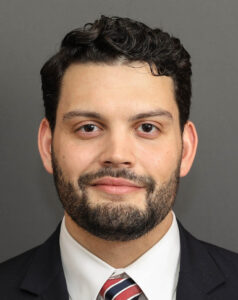
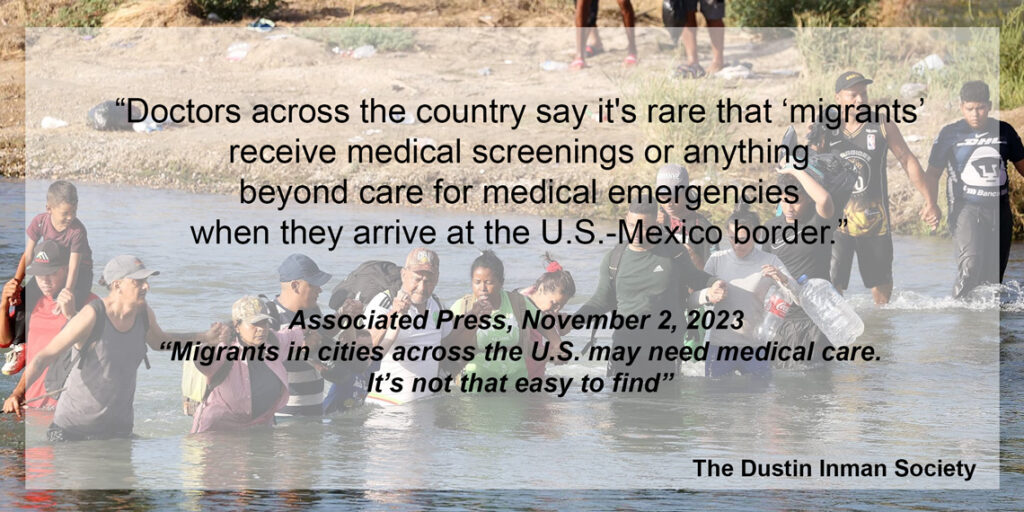

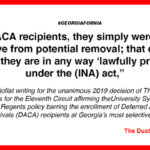
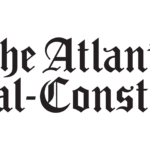
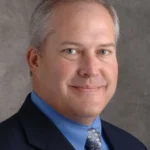



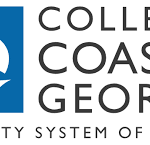
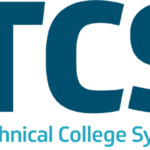
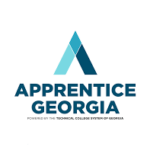







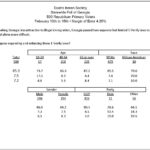




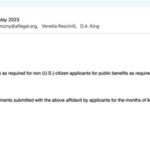
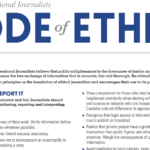





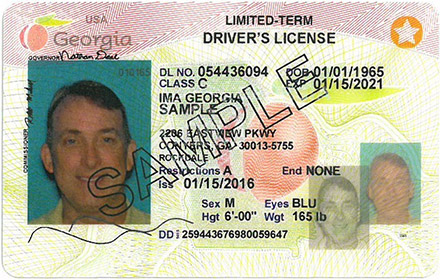




You must be logged in to post a comment.